Unit 6 Outdoor fun 单元总复习(共26张PPT,内嵌视频)
文档属性
| 名称 | Unit 6 Outdoor fun 单元总复习(共26张PPT,内嵌视频) | 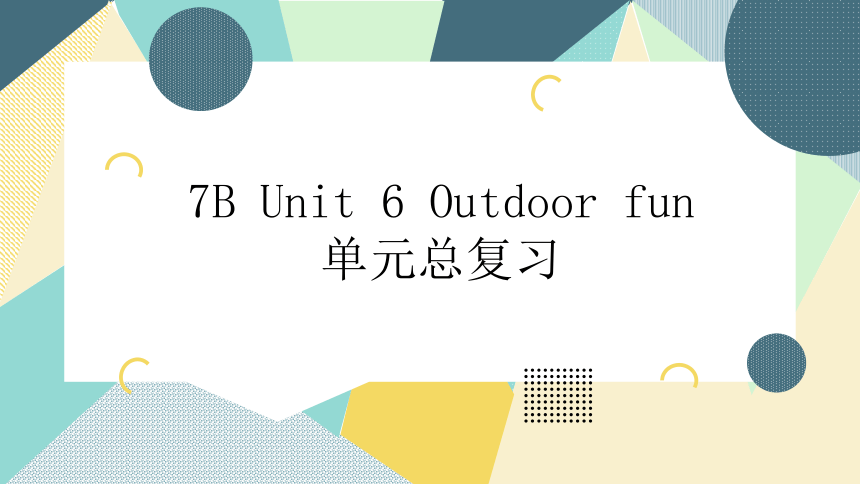 | |
| 格式 | pptx | ||
| 文件大小 | 32.9MB | ||
| 资源类型 | 教案 | ||
| 版本资源 | 牛津译林版 | ||
| 科目 | 英语 | ||
| 更新时间 | 2022-06-16 16:27:40 | ||
图片预览

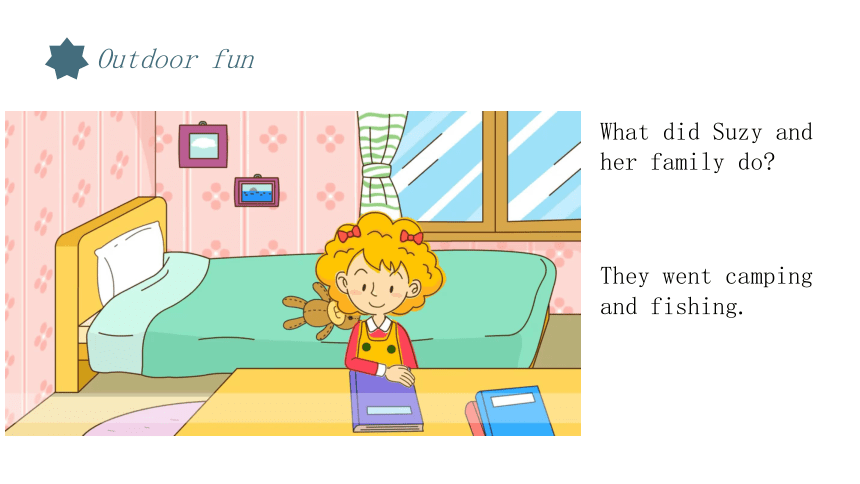

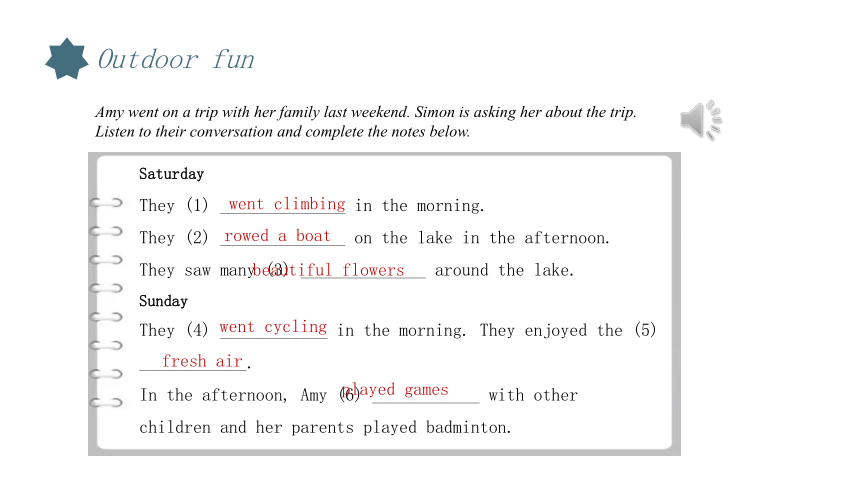
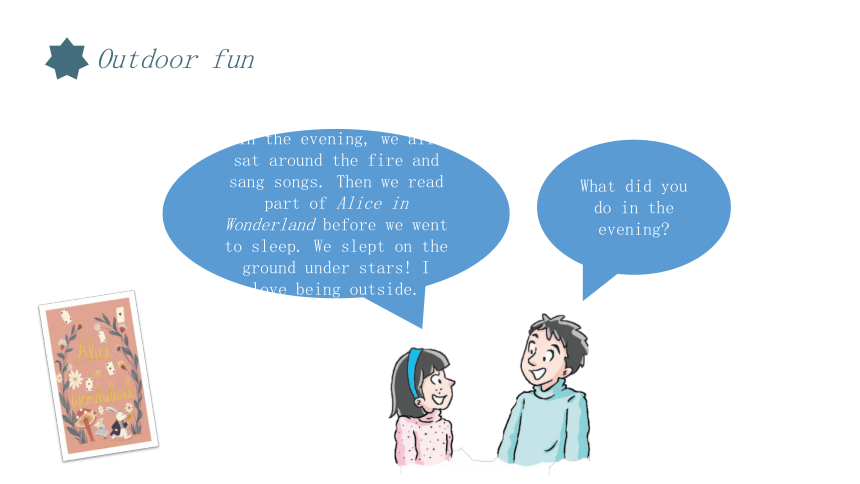

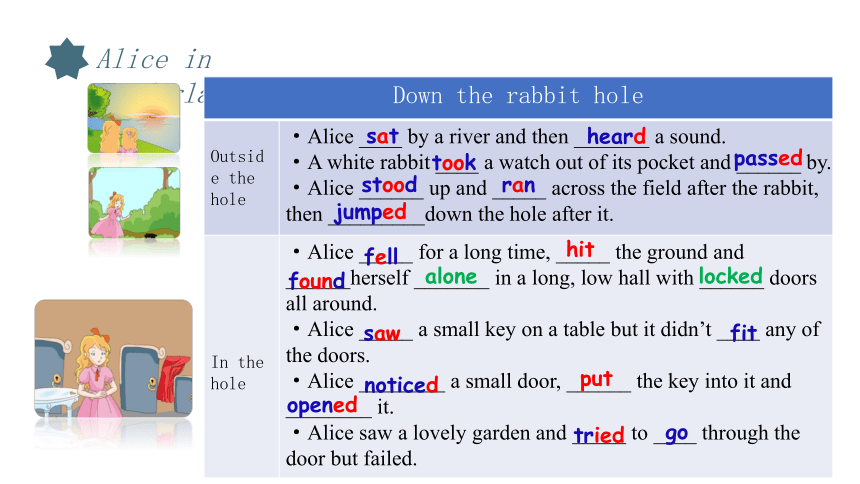
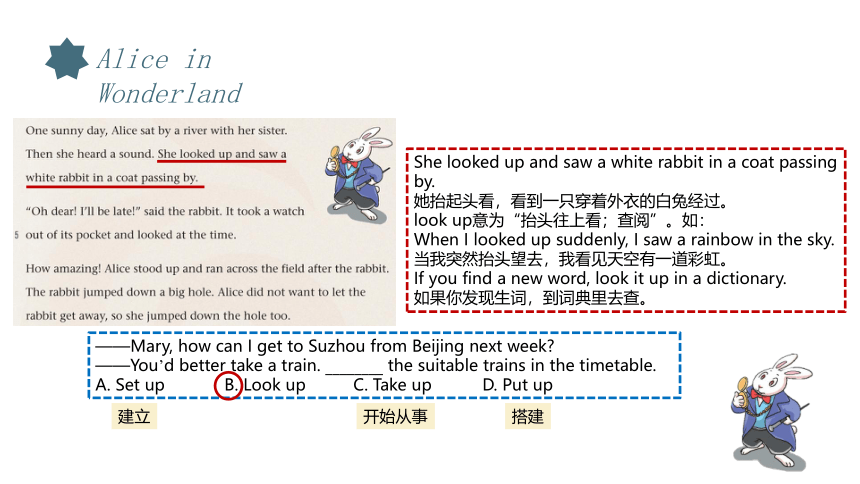
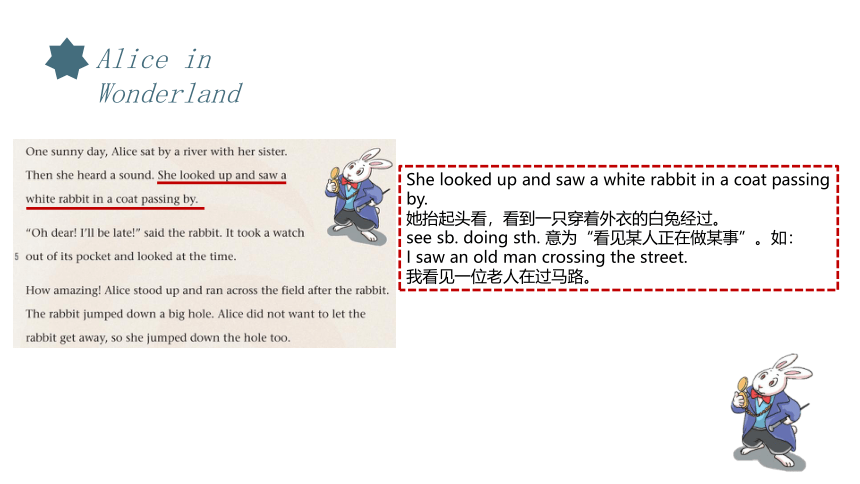
文档简介
(共26张PPT)
7B Unit 6 Outdoor fun
单元总复习
Outdoor fun
They went camping and fishing.
What did Suzy and her family do
Outdoor fun
jogging
swimming
camping
cycling
skating
riding
Outdoor fun
Amy went on a trip with her family last weekend. Simon is asking her about the trip. Listen to their conversation and complete the notes below.
Saturday
Sunday
They (1) ______________ in the morning.
They (2) ______________ on the lake in the afternoon. They saw many (3) ______________ around the lake.
They (4) ____________ in the morning. They enjoyed the (5) ____________.
In the afternoon, Amy (6) ____________ with other children and her parents played badminton.
went climbing
rowed a boat
beautiful flowers
went cycling
fresh air
played games
Outdoor fun
In the evening, we all sat around the fire and sang songs. Then we read part of Alice in Wonderland before we went to sleep. We slept on the ground under stars! I love being outside.
What did you do in the evening
Alice in Wonderland
Alice in Wonderland
Down the rabbit hole Outside the hole ·Alice ____ by a river and then _______ a sound.
·A white rabbit ____ a watch out of its pocket and ______ by.
·Alice ______ up and _____ across the field after the rabbit, then _________down the hole after it.
In the hole ·Alice _____ for a long time, _____ the ground and ______herself _______ in a long, low hall with ______ doors all around.
·Alice _____ a small key on a table but it didn’t ____ any of the doors.
·Alice ________ a small door, ______ the key into it and ________ it.
·Alice saw a lovely garden and _____ to ____ through the door but failed.
sat
heard
took
passed
stood
ran
jumped
fell
hit
found
alone
locked
saw
fit
noticed
put
opened
tried
go
She looked up and saw a white rabbit in a coat passing by.
她抬起头看,看到一只穿着外衣的白兔经过。
look up意为“抬头往上看;查阅”。如:
When I looked up suddenly, I saw a rainbow in the sky.
当我突然抬头望去,我看见天空有一道彩虹。
If you find a new word, look it up in a dictionary.
如果你发现生词,到词典里去查。
——Mary, how can I get to Suzhou from Beijing next week
——You’d better take a train. ________ the suitable trains in the timetable.
A. Set up B. Look up C. Take up D. Put up
建立
开始从事
搭建
Alice in Wonderland
She looked up and saw a white rabbit in a coat passing by.
她抬起头看,看到一只穿着外衣的白兔经过。
see sb. doing sth. 意为“看见某人正在做某事”。如:
I saw an old man crossing the street.
我看见一位老人在过马路。
Alice in Wonderland
She looked up and saw a white rabbit in a coat passing by.
她抬起头看,看到一只穿着外衣的白兔经过。
pass作动词,意为“经过;通过;传递”。如:
She passes my gate every morning when she goes to work.
她每天早晨上班时都路过我家门口。
Ten days passed quickly.
十天很快就过去了。
He passed the final exam.
他期末考试及格了。
Pass me the eraser, please.
请把橡皮递给我。
Alice in Wonderland
She found herself alone in a long, low hall.
她发现自己一个人在一个长而低的厅里。
句中的find oneself…意思是“发觉自己(处于某种意外的状态)”。如:
He woke up and found himself in a hospital bed.
他醒来发觉自己躺在医院的床上。
拓展
“find+宾语+介词短语”结构表示“发觉某人/某物在哪里”。如:
She opened the door and found a little cat outside the door.
她打开门,发现一只小猫在门外。
类似的结构还有:make/keep+宾语+形容词,如:
We must keep our classroom clean.
我们必须保持我们的教室清洁。
His words made us happy.
他的话让我们高兴。
Alice in Wonderland
She found herself alone in a long, low hall.
她发现自己一个人在一个长而低的厅里。
辨析alone和lonely
单词 词性 词义 用法
lonely 形容词 孤独的;寂寞的 带有感彩,在句中作表语或前置定语。修饰地点时,意为“荒凉的;偏僻的”。如:
The old man lived alone, but he never felt lonely.
那位老人独自生活,但他从没感觉孤单。
There is nothing there but a lonely mountain village.
除了一个荒凉的山村,那里什么也没有。
alone 形容词 单独的;独自的 在句中作表语或作名词的后置定语,强调别无他人。如:
She watches TV when she is alone.
她一个人时就看电视。
副词 单独地;独自地 主要用于陈述客观事实,强调独自一人,没有别的同伴。如:
He likes living alone.
他喜欢独自生活。
When you feel helpless and ______, just remember you are not ______ in the world because your friends are around you.
A. alone; alone B. alone; lonely
C. lonely; alone D. lonely; lonely
Alice in Wonderland
Alice tried to go through the door, but she was too big.
爱丽丝想通过那扇门,可是她个子太大了。
句中的through是介词,意思是“穿过,通过”,通常表示“从空间穿过”,而across表示“从表面穿过”。如:
walk through the forest
走过森林
run across the field
跑过田野
Alice in Wonderland
Paragraphs Plot
Para 1 She saw ___________ with a note on it said “__________”.
Para 2 She drank the juice and became __________________.
Para 3 She was ____________ to go through the door, so she __________ enter the garden. But she ___________ the key.
Para 4 She was ____________ reach the key. Then she saw a piece of cake with a note on the box said “_________”.
a little bottle
DRINK ME
smaller and smaller
small enough
decided to
forgot about
too small to
EAT ME
Read and complete
Alice in Wonderland
She looked down and saw that her body became smaller and smaller.
她朝下看,发现自己的身体变得越来越小。
这里smaller是small的比较级,意思是“较小的”。smaller and smaller意为“越来越小”。“比较级+and+比较级”意为“越来越......”。如:
The train moved away faster and faster.
火车开走了,速度越来越快。
At present, more and more people are using computers.
现在,越来越多的人在使用电脑。
Everyone knows that China is getting ______.
A. strong and strong
B. strongest and strongest
C. stronger and stronger
Alice in Wonderland
Soon Alice was small enough to go through the door, so she decided to enter the garden.
不久,爱丽丝小得足以通过那扇门了,于是她决定进入花园。
“形容词/副词+enough to do sth.”是固定结构,意为“足够……去做某事”。如:
Little Tom is old enough to go to school.
小汤姆足够大了,可以去上学了。
Mike is strong enough to carry the heavy box.
迈克强壮得足以搬动那个沉重的箱子。
Alice in Wonderland
Soon Alice was small enough to go through the door, so she decided to enter the garden.
不久,爱丽丝小得足以通过那扇门了,于是她决定进入花园。
短语decide to do sth. 意思是“决定做某事”。如:
He decided to give up the job.
他决定放弃这份工作。
We decide to have a picnic tomorrow.
我们决定明天去野餐。
Alice in Wonderland
Alice had to go back to the table, but she was too small to reach the key.
爱丽丝只好回到桌子旁,不过她已太小,够不着那把钥匙了。
短语too…to…意思是“太……而不能……”。其中too是副词,后接形容词或副词,to是动词不定式符号,后接动词原形。该结构之前与not、never等连用,表示肯定的意思。如:
The boy is too young to go to school.
这男孩太小,还不能上学。
He walked too slowly to catch up with me.
他走得太慢而不能跟上我。
It’s never ________ late ________ mend.
改过不嫌晚。
too to
Alice in Wonderland
Alice in Wonderland
Reporter: Was it a sunny day when you saw the rabbit
Alice: Yes, it were.
Reporter: Did you notice anything strange about the rabbit
Alice: Yes, I didn’t. It wore a coat and it spoke!
Reporter: Did you ran after the rabbit
Alice: Yes, I did. But then he jumped down a hole!
Reporter: Was you afraid of jumping down the hole
Alice: Yes, I did, but I really wanted to follow him!
Reporter: Was you find anything when you hit the ground
Alice: Yes, I did. I found a key on a table and lots of doors.
Reporter: Did the key fit any of the doors
Alice: No, it did. But then I saw another very small door.
Reporter: Was the key for that door
Alice: Yes, it wasn’t.
Reporter: Did you opened the door
Alice: Yes, I weren’t. But I was too big to go through it!
A newspaper interviewed Alice about her adventures in Wonderland. Read the interview. Underline the mistakes and write the correct words.
was
did
run
Were
was
Did
didn’t
was
open
did
类型 Be 动词 行为动词
Positive sentences (肯定句) 主语+___________
主语+____________
Negative sentences (否定句) 主语+__________________
主语+_________________
Questions (疑问句) ___________ +主语…
______+主语+_________…
was/were
was not/were not
Was/Were
动词过去式
did not +动词原形
Did
动词原形
Simple past tense (II)
did not= didn’t
was not= wasn’t
were not= weren’t
Simple past tense (II)
Simon went cycling with his friend last weekend. Amy is asking Simon about the cycling plete their conversation with the words in brackets.
Simon: I went on a long cycling with Neil today. After a few hours, I looked at my watch. It was late!
Amy: So what happened when you saw it was late
Simon: (1) _________________ (we/decide/to/go back). Then we got to a crossing in the road. (2) _______________ (we/not/know) which way to go!
Amy: (3) ________________ (what/you/do) (4) ________________(you/ask/anyone) to help you
Simon: There was nobody around! And because we were in the countryside, (5) __________________________ (my/mobile phone/not/work well). Then we saw a small car coming towards us. We stopped it and asked the driver the way back to the city.
Amy: Oh, you were lucky!
Simon: Yes! Then (6) ________________ (we/hurry up) because we wanted to go back home before it got dark.
Amy: So (7) ___________________ (when/you/get home)
Simon: Around 6 p.m. (8) ________________ (we feel tired) but we enjoyed our day very much!
We decided to go back
We didn’t know
What did you do
Did you ask anyone
my mobile phone didn’t work well
we hurried up
when did you get home
We felt tired
Further thinking
If we want to go on a long trip, we should…
What should we do when we do outdoor activities
prepare necessary(必要的) things.
go with adults(成年人).
wear light and comfortable shoes and clothes.
do some warm-up activities first.
help each other and work as a team.
Practice
( )1. — Did you see a dog at that time
— Yes. It ran the field.
A. passing by; across B. pass past; across
C. passing past; through D. pass by; cross
( )2. Don’t worry. She is to look after your child, but she can’t look after him as as you.
A. carefully enough; careful B. enough careful; carefully
C. careful enough; carefully D. enough carefully; careful
( )3. The girl by the window and saw some boys volleyball outside.
A. sits; to play B. sits; play C. sat; to play D. sat; playing
A
C
D
一、单项选择
Practice
( )4. — you tired after working for hours
— No. I feel tired at all.
A. Did; didn’t B. Were; wasn’t C. Were; didn’t D. Did; wasn’t
( )5. When he went camping, he a tent on his own.
A. put on B. put away C. put down D. put up
一、单项选择
C
D
二、根据汉语提示完成句子。
1. 快点,否则你上学又要迟到了。
, or you’ll be late for school again.
2. 不要抱怨太多。 Don’t .
3. Alice看到一只穿着外套的白兔经过。
Alice saw a white rabbit .
4. 在洞里Alice一个人也看不到。
Alice could see .
5. 我今天早上起床太晚,以至没能赶上首班公共汽车。
I got up late catch the first bus this morning.
Hurry up
complain too much
in a coat passing by
no one in the hole
too to
Practice
Homework
1. Review the words and phrases
2. Finish the exercise
https://www./
7B Unit 6 Outdoor fun
单元总复习
Outdoor fun
They went camping and fishing.
What did Suzy and her family do
Outdoor fun
jogging
swimming
camping
cycling
skating
riding
Outdoor fun
Amy went on a trip with her family last weekend. Simon is asking her about the trip. Listen to their conversation and complete the notes below.
Saturday
Sunday
They (1) ______________ in the morning.
They (2) ______________ on the lake in the afternoon. They saw many (3) ______________ around the lake.
They (4) ____________ in the morning. They enjoyed the (5) ____________.
In the afternoon, Amy (6) ____________ with other children and her parents played badminton.
went climbing
rowed a boat
beautiful flowers
went cycling
fresh air
played games
Outdoor fun
In the evening, we all sat around the fire and sang songs. Then we read part of Alice in Wonderland before we went to sleep. We slept on the ground under stars! I love being outside.
What did you do in the evening
Alice in Wonderland
Alice in Wonderland
Down the rabbit hole Outside the hole ·Alice ____ by a river and then _______ a sound.
·A white rabbit ____ a watch out of its pocket and ______ by.
·Alice ______ up and _____ across the field after the rabbit, then _________down the hole after it.
In the hole ·Alice _____ for a long time, _____ the ground and ______herself _______ in a long, low hall with ______ doors all around.
·Alice _____ a small key on a table but it didn’t ____ any of the doors.
·Alice ________ a small door, ______ the key into it and ________ it.
·Alice saw a lovely garden and _____ to ____ through the door but failed.
sat
heard
took
passed
stood
ran
jumped
fell
hit
found
alone
locked
saw
fit
noticed
put
opened
tried
go
She looked up and saw a white rabbit in a coat passing by.
她抬起头看,看到一只穿着外衣的白兔经过。
look up意为“抬头往上看;查阅”。如:
When I looked up suddenly, I saw a rainbow in the sky.
当我突然抬头望去,我看见天空有一道彩虹。
If you find a new word, look it up in a dictionary.
如果你发现生词,到词典里去查。
——Mary, how can I get to Suzhou from Beijing next week
——You’d better take a train. ________ the suitable trains in the timetable.
A. Set up B. Look up C. Take up D. Put up
建立
开始从事
搭建
Alice in Wonderland
She looked up and saw a white rabbit in a coat passing by.
她抬起头看,看到一只穿着外衣的白兔经过。
see sb. doing sth. 意为“看见某人正在做某事”。如:
I saw an old man crossing the street.
我看见一位老人在过马路。
Alice in Wonderland
She looked up and saw a white rabbit in a coat passing by.
她抬起头看,看到一只穿着外衣的白兔经过。
pass作动词,意为“经过;通过;传递”。如:
She passes my gate every morning when she goes to work.
她每天早晨上班时都路过我家门口。
Ten days passed quickly.
十天很快就过去了。
He passed the final exam.
他期末考试及格了。
Pass me the eraser, please.
请把橡皮递给我。
Alice in Wonderland
She found herself alone in a long, low hall.
她发现自己一个人在一个长而低的厅里。
句中的find oneself…意思是“发觉自己(处于某种意外的状态)”。如:
He woke up and found himself in a hospital bed.
他醒来发觉自己躺在医院的床上。
拓展
“find+宾语+介词短语”结构表示“发觉某人/某物在哪里”。如:
She opened the door and found a little cat outside the door.
她打开门,发现一只小猫在门外。
类似的结构还有:make/keep+宾语+形容词,如:
We must keep our classroom clean.
我们必须保持我们的教室清洁。
His words made us happy.
他的话让我们高兴。
Alice in Wonderland
She found herself alone in a long, low hall.
她发现自己一个人在一个长而低的厅里。
辨析alone和lonely
单词 词性 词义 用法
lonely 形容词 孤独的;寂寞的 带有感彩,在句中作表语或前置定语。修饰地点时,意为“荒凉的;偏僻的”。如:
The old man lived alone, but he never felt lonely.
那位老人独自生活,但他从没感觉孤单。
There is nothing there but a lonely mountain village.
除了一个荒凉的山村,那里什么也没有。
alone 形容词 单独的;独自的 在句中作表语或作名词的后置定语,强调别无他人。如:
She watches TV when she is alone.
她一个人时就看电视。
副词 单独地;独自地 主要用于陈述客观事实,强调独自一人,没有别的同伴。如:
He likes living alone.
他喜欢独自生活。
When you feel helpless and ______, just remember you are not ______ in the world because your friends are around you.
A. alone; alone B. alone; lonely
C. lonely; alone D. lonely; lonely
Alice in Wonderland
Alice tried to go through the door, but she was too big.
爱丽丝想通过那扇门,可是她个子太大了。
句中的through是介词,意思是“穿过,通过”,通常表示“从空间穿过”,而across表示“从表面穿过”。如:
walk through the forest
走过森林
run across the field
跑过田野
Alice in Wonderland
Paragraphs Plot
Para 1 She saw ___________ with a note on it said “__________”.
Para 2 She drank the juice and became __________________.
Para 3 She was ____________ to go through the door, so she __________ enter the garden. But she ___________ the key.
Para 4 She was ____________ reach the key. Then she saw a piece of cake with a note on the box said “_________”.
a little bottle
DRINK ME
smaller and smaller
small enough
decided to
forgot about
too small to
EAT ME
Read and complete
Alice in Wonderland
She looked down and saw that her body became smaller and smaller.
她朝下看,发现自己的身体变得越来越小。
这里smaller是small的比较级,意思是“较小的”。smaller and smaller意为“越来越小”。“比较级+and+比较级”意为“越来越......”。如:
The train moved away faster and faster.
火车开走了,速度越来越快。
At present, more and more people are using computers.
现在,越来越多的人在使用电脑。
Everyone knows that China is getting ______.
A. strong and strong
B. strongest and strongest
C. stronger and stronger
Alice in Wonderland
Soon Alice was small enough to go through the door, so she decided to enter the garden.
不久,爱丽丝小得足以通过那扇门了,于是她决定进入花园。
“形容词/副词+enough to do sth.”是固定结构,意为“足够……去做某事”。如:
Little Tom is old enough to go to school.
小汤姆足够大了,可以去上学了。
Mike is strong enough to carry the heavy box.
迈克强壮得足以搬动那个沉重的箱子。
Alice in Wonderland
Soon Alice was small enough to go through the door, so she decided to enter the garden.
不久,爱丽丝小得足以通过那扇门了,于是她决定进入花园。
短语decide to do sth. 意思是“决定做某事”。如:
He decided to give up the job.
他决定放弃这份工作。
We decide to have a picnic tomorrow.
我们决定明天去野餐。
Alice in Wonderland
Alice had to go back to the table, but she was too small to reach the key.
爱丽丝只好回到桌子旁,不过她已太小,够不着那把钥匙了。
短语too…to…意思是“太……而不能……”。其中too是副词,后接形容词或副词,to是动词不定式符号,后接动词原形。该结构之前与not、never等连用,表示肯定的意思。如:
The boy is too young to go to school.
这男孩太小,还不能上学。
He walked too slowly to catch up with me.
他走得太慢而不能跟上我。
It’s never ________ late ________ mend.
改过不嫌晚。
too to
Alice in Wonderland
Alice in Wonderland
Reporter: Was it a sunny day when you saw the rabbit
Alice: Yes, it were.
Reporter: Did you notice anything strange about the rabbit
Alice: Yes, I didn’t. It wore a coat and it spoke!
Reporter: Did you ran after the rabbit
Alice: Yes, I did. But then he jumped down a hole!
Reporter: Was you afraid of jumping down the hole
Alice: Yes, I did, but I really wanted to follow him!
Reporter: Was you find anything when you hit the ground
Alice: Yes, I did. I found a key on a table and lots of doors.
Reporter: Did the key fit any of the doors
Alice: No, it did. But then I saw another very small door.
Reporter: Was the key for that door
Alice: Yes, it wasn’t.
Reporter: Did you opened the door
Alice: Yes, I weren’t. But I was too big to go through it!
A newspaper interviewed Alice about her adventures in Wonderland. Read the interview. Underline the mistakes and write the correct words.
was
did
run
Were
was
Did
didn’t
was
open
did
类型 Be 动词 行为动词
Positive sentences (肯定句) 主语+___________
主语+____________
Negative sentences (否定句) 主语+__________________
主语+_________________
Questions (疑问句) ___________ +主语…
______+主语+_________…
was/were
was not/were not
Was/Were
动词过去式
did not +动词原形
Did
动词原形
Simple past tense (II)
did not= didn’t
was not= wasn’t
were not= weren’t
Simple past tense (II)
Simon went cycling with his friend last weekend. Amy is asking Simon about the cycling plete their conversation with the words in brackets.
Simon: I went on a long cycling with Neil today. After a few hours, I looked at my watch. It was late!
Amy: So what happened when you saw it was late
Simon: (1) _________________ (we/decide/to/go back). Then we got to a crossing in the road. (2) _______________ (we/not/know) which way to go!
Amy: (3) ________________ (what/you/do) (4) ________________(you/ask/anyone) to help you
Simon: There was nobody around! And because we were in the countryside, (5) __________________________ (my/mobile phone/not/work well). Then we saw a small car coming towards us. We stopped it and asked the driver the way back to the city.
Amy: Oh, you were lucky!
Simon: Yes! Then (6) ________________ (we/hurry up) because we wanted to go back home before it got dark.
Amy: So (7) ___________________ (when/you/get home)
Simon: Around 6 p.m. (8) ________________ (we feel tired) but we enjoyed our day very much!
We decided to go back
We didn’t know
What did you do
Did you ask anyone
my mobile phone didn’t work well
we hurried up
when did you get home
We felt tired
Further thinking
If we want to go on a long trip, we should…
What should we do when we do outdoor activities
prepare necessary(必要的) things.
go with adults(成年人).
wear light and comfortable shoes and clothes.
do some warm-up activities first.
help each other and work as a team.
Practice
( )1. — Did you see a dog at that time
— Yes. It ran the field.
A. passing by; across B. pass past; across
C. passing past; through D. pass by; cross
( )2. Don’t worry. She is to look after your child, but she can’t look after him as as you.
A. carefully enough; careful B. enough careful; carefully
C. careful enough; carefully D. enough carefully; careful
( )3. The girl by the window and saw some boys volleyball outside.
A. sits; to play B. sits; play C. sat; to play D. sat; playing
A
C
D
一、单项选择
Practice
( )4. — you tired after working for hours
— No. I feel tired at all.
A. Did; didn’t B. Were; wasn’t C. Were; didn’t D. Did; wasn’t
( )5. When he went camping, he a tent on his own.
A. put on B. put away C. put down D. put up
一、单项选择
C
D
二、根据汉语提示完成句子。
1. 快点,否则你上学又要迟到了。
, or you’ll be late for school again.
2. 不要抱怨太多。 Don’t .
3. Alice看到一只穿着外套的白兔经过。
Alice saw a white rabbit .
4. 在洞里Alice一个人也看不到。
Alice could see .
5. 我今天早上起床太晚,以至没能赶上首班公共汽车。
I got up late catch the first bus this morning.
Hurry up
complain too much
in a coat passing by
no one in the hole
too to
Practice
Homework
1. Review the words and phrases
2. Finish the exercise
https://www./
